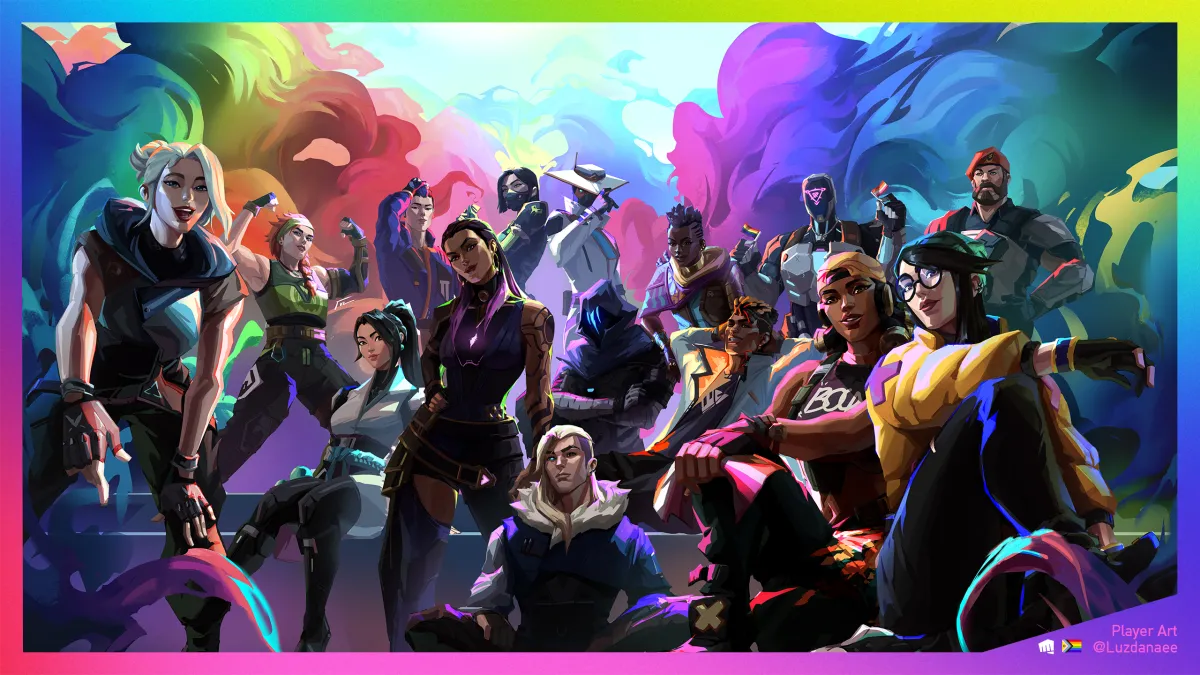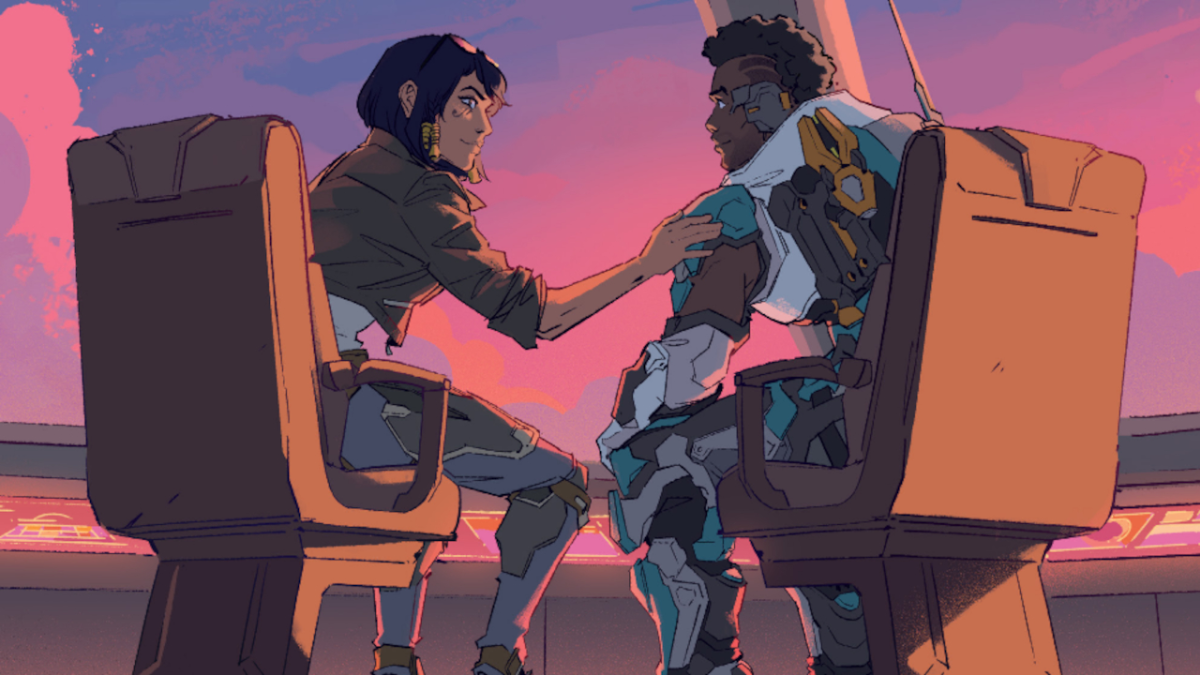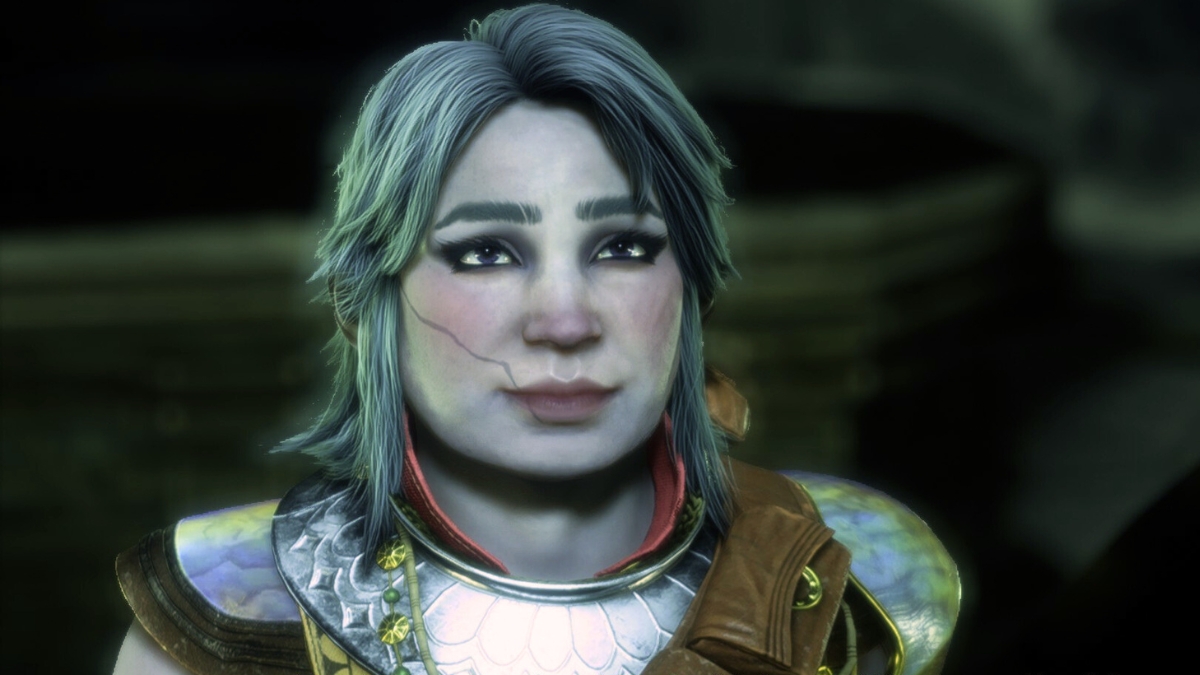“I would have thought it was obvious,” Pharah said in the latest Overwatch 2 short story, “As You Are.” “I’m not passing, am I?”
Pharah, of course, is talking about her sexuality. In a short conversation with fellow Overwatch hero Baptiste, Pharah revealed that she is a lesbian. The story, which hinted at Pharah’s seemingly not-straight feelings toward Dr. Angela “Mercy” Ziegler, also coincided with an in-game event that offers an extensive collection of Pride-themed banners and profile pictures. One of these confirms Baptiste is bisexual. The game’s New York City map has been turned into a post-Pride parade stomping ground too, complete with Pride flags hanging across all sorts of Midtown apartments.
It’s hard to put into words how much this excited me. For one, I called it. When Overwatch 2 launched last fall, I wrote about Pharah flirting with Mercy in-game, seemingly suggesting the seven-year-old Pharmercy ship might be more than fandom headcanon. Plus, Pharah is one of my in-game mains, and as a more competitively oriented gamer myself, I’ve always related to her sense of justice and ambition wrapped up in a femme-jock aesthetic.
But it was Valorant’s rewards that really took me by surprise this year, and made me pause and think about my own relationship with Pride in 2023.
“Nice Pride banner”

Admittedly, I haven’t played much Overwatch over the past few months, trading in my hero shooter days for another FPS game popular with queer and trans players: Riot Games’ Valorant. Launched in 2020, Valorant blends Counter-Strike-style tactical shooter gameplay with hero-specific abilities. Many of the games’ characters are women, as are its players. Late last year, Riot confirmed two of its most popular female agents—Killjoy and Raze—are going steady.
In 2021, Riot Games introduced a series of in-game banners with Pride flags, including the trans flag, pansexual flag, ace flag, and lesbian flag. Riot further expanded the offering last year with the trans-inclusive gay male Pride flag and a rainbow-themed gun buddy (literally a keychain you can attach to your weapon in-game). I was a bit late to the party in 2021 and 2022, so I was pleasantly surprised to see that Riot brought the entire collection back this year, redeemable for free via the in-game store.
I grabbed up the Pride flags immediately, surprising even myself. I didn’t expect to care this much about the rewards my favorite video games gave me for Pride.
I’ve seen the Valorant Pride banners in-game for a long time now, pretty much ever since I started playing the tactical shooter again in August 2022. I really appreciated them, of course, but I always felt they were a bit gauche; a bit too on the nose. I’m pretty open about being a trans lesbian, and there are certainly a lot of lesbian trans women who also play Valorant (my five-stack is pretty much full of them). But I always communicated my identity more subtly—friending other women who I realize are queer in-game, or complimenting other players on their Pride flags if we’re vibing. Otherwise, I really had no aspirations to out myself in a game like Valorant, which, despite its high percentage of queer, trans, and female players, is still known for toxicity across ranks.
Something changed this year, though. June 1 hit and suddenly everything came to the forefront. I felt queer pride. I felt trans joy. I felt dyke rage at the state of the world in 2023, and fear for my existence as a trans lesbian. I felt the need to make my appearance and place as a queer person in this game seen and understood, so people couldn’t deny the fact that queer trans women like myself belong in competitive gaming. I immediately switched my banner to the lesbian flag and added the Pride gun buddies to my weapons with the highest skill ceiling. It was bit of a flex: Yeah, I’m a lesbian, I’m gay, and I’m good with the most powerful pistol in the game. Deal with it.
Is it rainbow capitalism, or something else?

But there’s another, deeper reason why all these Pride events have really hit home for me. The world has gotten scarier for queer Americans over the past two years, and trans women in particular have seen some of the harshest backlash from right-wing bigots. Widespread boycotts have targeted major corporations like Bud Light and Target, with right-wingers fear-mongering around Dylan Mulvaney’s gender identity and tuck-friendly swimsuits for trans women, respectively. In both cases, the companies have caved in response to the boycotts, only further appeasing some of the nastiest and most violent anti-LGBTQ bigots in the country. Experts fear that these corporations are encouraging more and more boycotts against LGBTQ-friendly companies, essentially causing an anti-LGBTQ contagion event.
“If you are going to take these steps to embrace the LGBTQ+ population in a public way, you have to have the courage of your convictions to see it through,” Southern Poverty Law Center senior investigative reporter Michael Edison Hayden told ABC News. “Once you make that decision to do that, and you back away in fear, it is those people you are putting at risk, who are frequently a target of harassment, intimidation—as we’ve seen also, catastrophic violence.”
I’m sure the developers behind Overwatch and Valorant are very aware of the Target and Bud Light backlash. And while I don’t want to give credit to the enormous, multi-billion dollar companies that are pushing out these games, the individual people working on these multiplayer titles, who stuck their neck out from the start to make sure their games celebrated LGBTQ players, deserve praise. To see Overwatch and Valorant’s developers double down on Pride offerings in the face of anti-LGBTQ domestic terrorism makes me feel like the designers, artists, and programmers who create my favorite games actually have my back. And they probably do, knowing how many queer people work in game development.
Yes, it’s rainbow capitalism. It’s a way to convince me to spend my queer dollar on gun skins and battle passes. But there are also companies that are abandoning me and choosing the GOP over my basic human rights. And it helps to know that isn’t a universal truth right now, especially with my favorite games.
(featured image: Blizzard Entertainment)









Published: Jun 2, 2023 01:31 pm